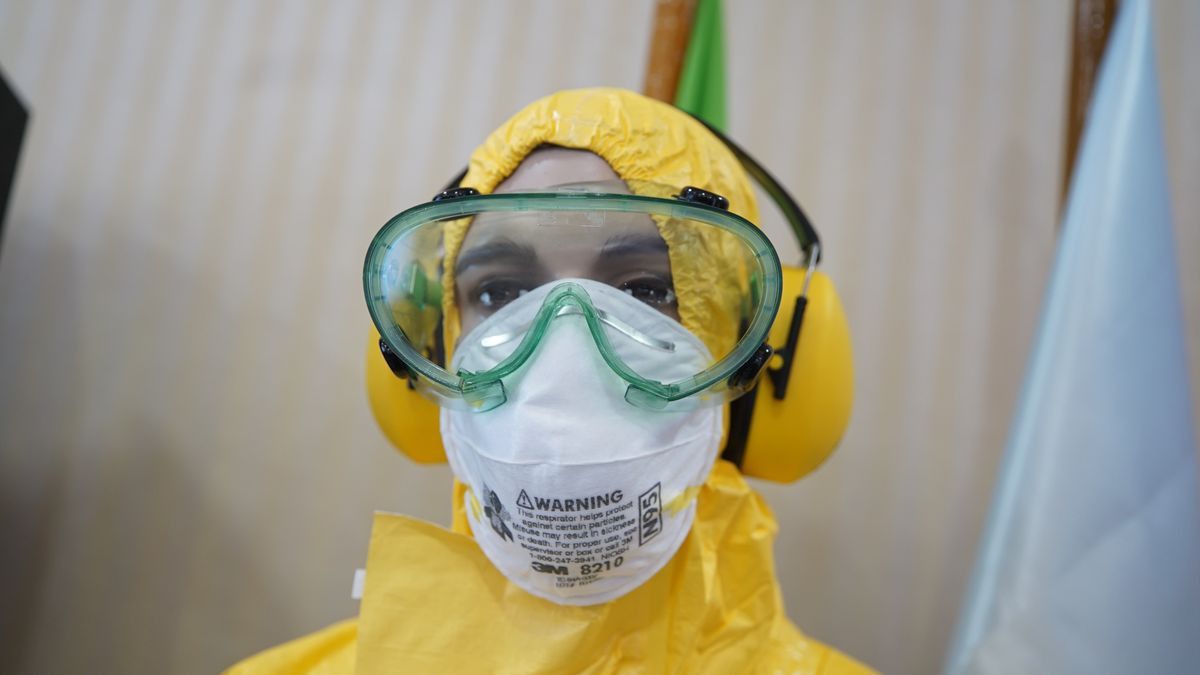JAKARTA - After surviving for several months from the wave of COVID-19 that has infected a number of countries, finally two citizens in Indonesia have contracted the virus. Now, these two people and several other people who are also suspected of COVID-19 are currently undergoing treatment at the Sulianti Saroso Central Infection Hospital (RSPI), Jakarta.
Some time ago, we had the chance to interview those who were face to face with patients living with COVID-19 there. We got an interesting view, it turns out that they have no worries in their minds even though they have to treat people who have contracted the virus.
At RSPI Sulianti Saroso, we met a lung specialist, Dr. Yuki. In a brief conversation, Yuki admitted that he didn't feel worried when he had to meet his patient. This is because during his duties he always uses personal protective equipment (PPE) that meets the standards.
Likewise after he met his patient. According to the existing procedure, Yuki will clean her body so that no virus is carried away when she takes off the personal protective equipment she uses. In addition, he is also used to taking care of patients who are associated with viral and bacterial infections long before the spread of COVID-19.
"Because we are accustomed to wearing the right and proper PPE, accustomed to dealing with cases that are more severe than this, so we have experience, yes. So you don't have to be afraid, even though you are vigilant," Yuki told us during the brief meeting.
Yuki did feel worried at first, but later he realized that by using PPE and carrying out all the existing procedures, he had nothing else to worry about.
While his family, he said, also did not experience excessive worry. The reason is, almost his entire family is also a medical officer. So, they quickly understood about the virus, which initially spread in Wuhan City, China.
"So all of us (as a family) already know what the transmission is like. Indeed, transmission is fast if the COVID-19 virus or the name of the virus is Sars COV-2. We only know that the mortality rate is small. So people in the house are not too worried, actually. It's safe. , "he said.
Moreover, he is actually often in charge of helping patients undergo the treatment process since the spread of the Mers-CoV virus and bird flu. Reflecting on these cases, Yuki has also assured his family that he will be safe considering that the patients have been treated in a special isolation room.
According to him, the spread of the virus in this special isolation room is actually rare. Because, in this room there are negative ions. "So it is very, very unlikely that we will come out carrying this virus," he said.
Meanwhile, for the neighbors around his house, Yuki often gave the understanding that COVID-19 is actually a virus that can die by itself or limiting self disease. The reason is that this disease can die if the patient's immune system gets better or will not be contagious if a person's immune system is strong enough.
In the short interview, Yuki also shared tips with us on how to maintain endurance amid the spread of the virus. First, he asked people to eat regular healthy food three times a day. Furthermore, don't forget to get enough rest.
"It can be 4 to 6 hours at a minimum. Then we maintain personal hygiene, because we don't know the affected places (contaminated with the COVID-19 virus). That means we have to wash our hands frequently with running water and soap or wash our hands with an alcohol-based handrub. "He explained, adding that people who are not feeling well or have a cold and cough can use a mask to prevent transmission.
Apart from Yuki, we also met a special nurse in the isolation room of RSPI Sulianti Saroso, Widia. Briefly speaking, this woman said she was not worried while carrying out her duties to care for people with the COVID-19 virus.
Because, from the beginning he had been given an understanding of the transmission of the virus and had worked for five years as a nurse in an isolation room.
Not only that, there are procedures that have been put in place to prevent transmission of the virus, including using personal protective equipment (PPE). "I think after following the procedure, God willing, I will not be infected," said Widia.
Even though he was not worried, however, Widia still gave understanding to his family about the COVID-19 virus. Including, notifying if the isolation procedure has been carried out properly in the workplace. "And thank God they understand because this is my job and rest assured that here we are protected," he said.
Interact with patients
Yuki, a pulmonary specialist, tells of his experiences when interacting with his patients. He said, the interaction could not take too long. Remember, when doing the examination he used personal protective equipment (PPE) and this made his movement difficult. Because, when using this tool which consisted of clothes and an N-95 mask, he felt tightness.
"So if you wear PPE correctly, the person who will wear it will be suffocating in a matter of two hours. So it can't take long," he said with a laugh.
Even so, the interactions still exist even if only for a short time. Including, when the patient confides he will serve it. "So, if for example, we will listen to it, we will respond according to what he said. But it didn't take long for one patient. Because the mask was uncomfortable, his clothes were uncomfortable," he explained.
Yuki also said that there was a patient who was under surveillance who was quite old and did not have a smartphone. As a result, this patient felt bored and finally he accompanied him for two hours to just chat or listen to his patient's story. However, during interacting with his patients, he admitted that he was not afraid.
So that when there is panic in the community, he is also confused about why it happened. Because, as a person who is in contact with a patient with COVID-19, he doesn't feel the need to worry. Moreover, the transmission rate is indeed high but the number of those who recover is also quite high in the world.
Similar to Yuki, Widia also explained that she often accompanies patients who feel bored in the isolation room by chatting. He also often provides motivation for patients not to worry about their situation. The goal is that patients are familiar with the nurses in the special isolation room.
Widia also shared what she impressed the most while treating patients, namely seeing patients recovering and leaving with a smile.
"When the patient comes out of the room healthy, with a word of thanks, that smile is the happiest thing."
The English, Chinese, Japanese, Arabic, and French versions are automatically generated by the AI. So there may still be inaccuracies in translating, please always see Indonesian as our main language. (system supported by DigitalSiber.id)









